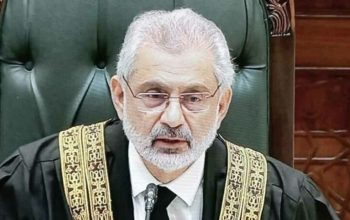A full court meeting convened on Monday ahead of hearing a set of challenges to the Supreme Court (Practice and Procedure) Act 2023.
The meeting will consider live broadcasting of today’s proceedings.
After being appointed as the 29th Chief Justice of Pakistan, Justice Qazi Faez Isa formed the full court to hear the petitions challenging the SC practice law.
A 15-member full court bench comprising Justice Sardar Tariq Masood, Justice Ijazul Ahsan, Justice Syed Mansoor Ali Shah, Justice Munib Akhtar, Justice Yahya Afridi, Justice Aminuddin Khan, Justice Sayyed Mazahar Ali Akbar Naqvi, Justice Jamal Khan Mandokhel, Justice Muhammad Ali Mazhar, Justice Ayesha A. Malik, Justice Athar Minallah, Justice Syed Hasan Azhar Rizvi, Justice Shahid Waheed and Justice Musarrat Hilali will hear the case.
Meanwhile, Justice Isa refused to receive a guard of honour upon arriving at the SC. He was given a warm welcome by the SC staff.
The enforcement of the SC (Practice and Procedure) Act, 2023 had been suspended on August 11 on the order of an eight-judge apex court bench, headed by the then Chief Justice of Pakistan Umar Ata Bandial.
The bench declared the act null and void.
The Supreme Court (Review of Judgements and Orders) Bill 2023 was passed by the National Assembly on April 15 and is aimed at giving right of appeal under Article 184 of the constitution – a right which was not available in the past.
The bill
The previous Pakistan Democratic Movement (PDM) led government had enacted the Supreme Court (Practice and Procedure) Act, 2023, in a bid to clip the chief justice’s powers to form benches and fix any case before him.
The bill was passed by the parliament earlier this year.
However, an eight-judge bench, including the former CJP Umar Ata Bandial, stayed the bill’s implementation after a set of three petitions challenging it.
The Supreme Court (Practice and Procedure) Bill, 2023, serves multiple purposes, including the delegation of suo motu notice-taking authority to a three-member committee composed of senior judges, including the chief justice.
The bill aims to ensure transparent proceedings within the apex court and safeguard the right to appeal.
The bill outlines the constitution of benches, specifying that a committee consisting of the chief justice and the two most senior judges will be responsible for constituting benches to handle cases, and decisions will be reached by majority vote.
Regarding cases invoking the apex court’s original jurisdiction under Article 184(3), the bill stipulates that they must first be presented to the aforementioned committee for consideration.
Moreover, the bill grants the committee the authority to form a bench comprising at least three judges from the Supreme Court, which may include members of the committee itself, to adjudicate on matters of significant public importance relating to the enforcement of fundamental rights.
Read the full story at the Business Recorder - Latest News website.



